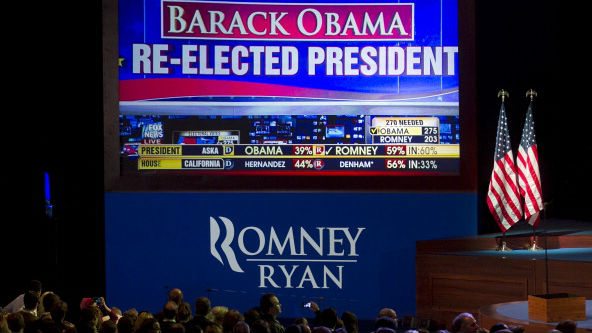After the fall: the Republicans meet their reckoning
“We had no message and we gave it to the worst communicator in the world”, said one aide. As the defeat sinks in, the Republicans’ search for blame begins.

Welcome to Romneyworld: and the cold wind of reality that is blowing through the vacant corridors of the Republican dream. More than one billion dollars was spent on getting precisely nowhere, defeated by the sheer power of the Obama election machine.
But this was about more than inferior organisational skills. The Republican credo, the brash mix of ultra-conservatism and negative messaging appears to have turned off voters in droves.
The base which the party relied on to turn out at the polls was simply too narrow: too white, too male, too old, to reflect the diversity of this fast-changing America.
What Politico described as the “conservative media bubble”, the total reliance on Fox News and right wing radio, left the GOP radically out of touch with what the country was really thinking.
Now the search for blame begins, and serious discussions about where the party can possibly go from here. It is time for change, and a new direction: new leaders, perhaps, to reach out to a new generation.
Good money after bad?
But for now, the recriminations are coming thick and fast, not least from those multi-millionaires whose vast donations fuelled the most expensive election campaign ever fought.
Karl Rove, reputedly the super-guru of electioneering, has called the mega-donors behind his Crossroads SuperPAC, which poured more than a hundred million dollars not just into the Romney campaign, but into losing House and Senate races around the country.
The dizzying numbers behind that advertising blitz were mostly down to outside groups like Crossroads: together their money made up some forty percent of the total spend behind the Romney campaign. Unsurprisingly, some of the donors are starting to question why their millions were spent to so little effect.
POTUS re-elected. More Ds in Senate and House. There are a bunch of pissed off billionaires this morning, looking for the refund window!
— David Axelrod (@davidaxelrod) November 7, 2012
Foster Freiss, who kept the Rick Santorum primary campaign afloat claimed “I have not been a fan of ads from day one”, claiming he would prefer to put his money into building a more effective grassroots organisation.
Sheldon Adelson has swiped back at accusations that he wasted the $70m which he poured into various Republican groups, and as for Rove himself, he told Fox News it had all been worth it. “If groups like Crossroads were not active, this race would have been over a long time ago.”
Yet there are more fundamental issues at stake: a case, perhaps, of not shooting the messenger, but the message itself. The values of the Republican party of 2012, a result of that resurgence of Tea Party activists in 2010 and the long, damaging primary campaign which pushed its politics even further to the right, now look seriously out of kilter.
Ohio Senator Rob Portman, perhaps Mitt Romney’s closest aide, called it a “wake up call”, while West Virginia Representative Shelley Moore Capito told Politico: “we’re not diversified like the country.”
Some of the more extremist candidates certainly didn’t help matters: Todd Akin and Richard Mourdock, with their way-out comments on rape and abortion scared off not just moderate voters, but women, whose support proved crucial to Obama’s re-election success.
Shoot the messaging
The defeat of Akin and Mourdock in their Senate races also helped to dash any Republican hopes of winning back control. “Extremists”, commented the Democratic Senate Congressional Committee chair Patty Murray, “are doming their party to disaster. If Republicans want to follow the Tea Party off a political cliff, that’s their prerogative.”
If women were turned off by all the 1950s style social messaging, then Hispanics and African Americans were turned off by the sheer lack of relevance in the GOP platform. Despite showing off a few high profile minority leaders at their convention, the party completely failed to reach out to communities beyond its traditional white, male base.
Immigration is one issue, but so too the possibility of up-and-coming leaders like Florida senator Marco Rubio, or the state’s former governor Jeb Bush, who both have a far more instinctive understanding of Hispanic priorities and concerns.
In fact, at a moment when his own state is still counting votes in the 2012 election, Rubio is already heading to Iowa – the state where many a presidential campaign begins – to headline a fundraiser for the state’s governor next weekend. Be warned: the 2016 campaign starts here.
As for Mitt Romney, he has been trying to come to terms with his defeat. Reporters invited to an early morning briefing in Boston detected a deep feeling of unfairness at the way he thought he had been portrayed, not just by his opponent, but by the media.
According to the New York Times, some of his aides wiped away tears as he thanked his staff and talked about the friends he had made, his own voice breaking as he talked of what might have been.
But Romneyland was not to be: although there is still a sizeable Republican constituency, the stridency of its current platform is clearly no fit for these more diverse, more tolerant times. So now the soul searching begins, and the blame: but beyond that, some serious decisions.
The road from here, to diversity, will not be easy.
Felicity Spector writes about US politics for Channel 4 News